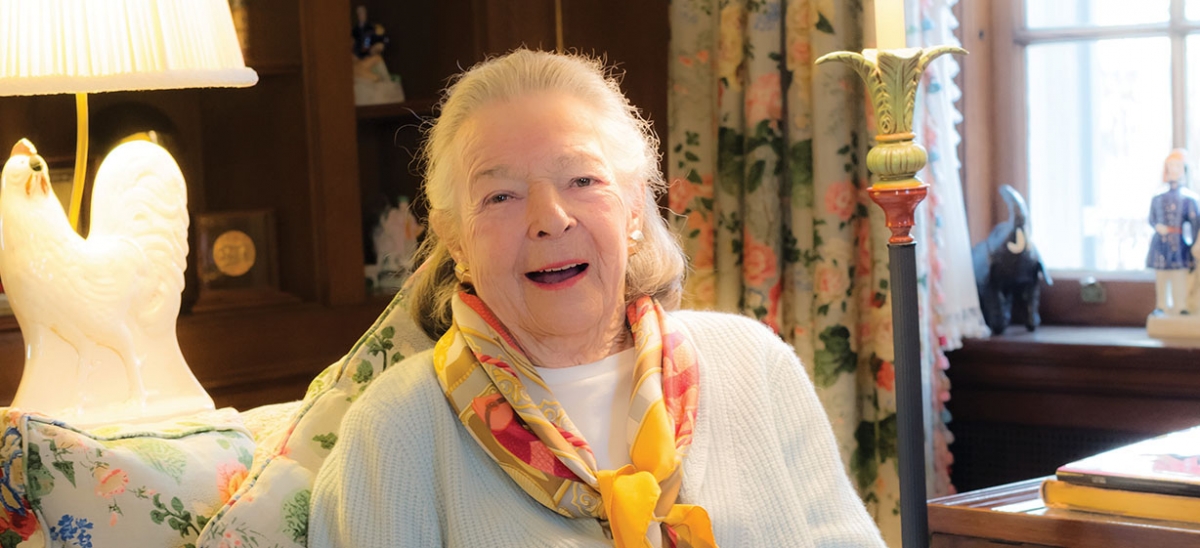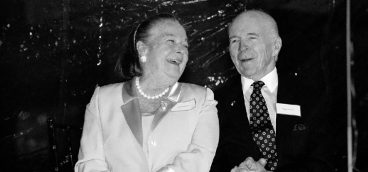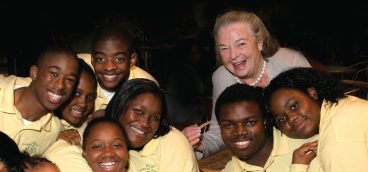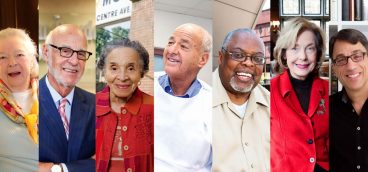Elsie H. Hillman, Political and Civic Leader

Instrumental in the political campaigns of: Dwight Eisenhower, William Scranton, John Heinz, Gerald Ford, Richard Thornburgh, George H.W. Bush, Barbara Hafer, Tom Ridge and Arlen Specter Board member of many organizations through the decades, including: WQED Multimedia, the Hill House Association, the Urban League, Carlow University and the Hillman Family Foundations.
Where does my story begin? That depends on what part you want to tell. I was one of five children and lived in Fox Chapel. I was born on Aylesboro Avenue, at home. We lived in the country, but our house burned down—to the ground—when I was about 10, so we had to move. I ended up living a lot with my grandmother on Homewood Avenue in South Homewood, in a house that is no longer there. My father, Thomas J. Hilliard, and mother, Marianna Talbott Hilliard, were fairly comfortable but had a great volunteer ethic. Their example of community volunteerism made me and all of my siblings feel that involvement outside of one’s self was an important thing to do. But my parents had some tougher times along the way, too. Among other things, Mom went to work and sold glass. Dad worked for U.S. Steel, finally as an executive vice president, and did well. For me, growing up was a fine experience. My mother was one of nine children and we had many reunions with her family from Dayton, Ohio—and we still do.
My husband, Henry Lea Hillman, is seven years older than me. He is the son, of course, of Pittsburgh steel mogul John H. Hillman, Jr., an industrialist who built Pittsburgh Coke & Chemical. Anyway, Henry was a friend of my older sister, and I knew his younger sister, so we all became friends. When I graduated from boarding school, my mother agreed to let me go to New York to visit my brother. She just called him up and said, “I’m sending your sister to stay with you for a while,” and off I went. One day, my brother had a date, so he called Henry to come and go out with me. A year later, in 1945, Henry and I were married. In the meantime, however, I went for a year to Westminster Choir College in Princeton, N.J., which was founded by my grandmother. She wanted to be an opera singer, but instead had nine children and was never able to realize her dream. That was my sole college experience. Honestly, I never liked school, but I had great fun in my early days.
It’s true that, over the years, Henry has become a rather legendary figure in western Pennsylvania. He’s a very, very bright man. How we have put up with each other over all these years—69 in all—I’ll never know. But I was engaged at 18 and married at 19, and Henry and I have had a wonderful life together. The funny part is that we didn’t know each other very well at the beginning. And I never thought about where I’d be five years after I was married, let alone after 50 years or more. But somehow, Henry and I have clicked. Our interests are the same, even if our ways of going about things are different.
Henry and I have different personalities. He studies everything carefully and pays attention to details, and pros and cons. He writes things down and considers them. Me? I go with what I feel. Take politics, for example. I really liked Eisenhower, which is why I got involved in the Republican Party as a volunteer in the first place. “Ike” was a great leader. But when I told Henry what I was planning to do, he warned me: “Once you get involved in politics, Elsie, it’s going to be like eating peanuts. You’re going to go on forever.” Well, as usual, Henry was right. But he was always very patient with me during my years of political work, for the party and for candidates, even though we’re both now wondering why, today, we’re still Republicans. We don’t want to change much at this point, I suppose. So I guess we’ll be Republicans forever—for better or worse. During my years of heavy involvement with the Party, I’m sure that there were many moments when the “leadership” wished that I would disappear. But I didn’t. And back then, there were enough other clear-headed moderate members like me for us to make some significant changes and advances over time.
Henry and I have always believed that the top and the bottom of any community shouldn’t be light years apart in either education or opportunity. That belief has always been in my soul, so I began to try to unlock the doors of opportunity for all people in our community. Early on in my political life, during the 1950s, I learned that there were very few African Americans in the Republican Party, so I started trying to make the Party more inclusive by bringing them in. As a result, I found out how they lived, which I didn’t know before. That taught me a lot about what went on in this community, below the surface. Education wasn’t equal. And many people didn’t have opportunity. What this said to me was that we had to change things. And to his great credit, Henry agreed.
You know, in the 1960s, I remember an incident that Henry had with a man named Nate Smith. Nate was a black civil rights activist in Pittsburgh who worked hard to serve African American labor workers. He used his own body to stop bulldozers working on the U.S. Steel Tower and Three Rivers Stadium because there were no blacks working on those construction jobs. Nate had a powerful presence. One day, he burst through the door of the Hillman Company and proceeded up to Henry’s office. Once there, he stepped forward and asked, “Are you Henry Hillman?” Henry said, “Yes,” and stood up to shake his hand. Nate never forgot that. And he became a good friend of mine. Through the years, I served on the board of the Urban League and other organizations important to African-American life in Pittsburgh. So I’ve spent a lot of time with this idea of equal opportunity for all on my mind and in my heart. The sad part is we haven’t gone the whole way with it—still.
When Barack Obama was elected President, I thought it was wonderful. But I didn’t vote for him in 2008 (even though Henry did). Incidentally, I didn’t vote for John McCain either—and certainly not for Sarah Palin. I didn’t vote for either candidate that time, believe it or not. The second time around, however, I couldn’t buy into Mitt Romney, so I voted for Obama. I don’t know what’s going to happen with the Republican Party now. I listen to our representatives these days and it breaks my heart.
It’s funny because, as Henry and I find ourselves now at rather advanced ages, sometimes we wish we could do it all over again. What would we do differently? Not much, probably. I say to myself sometimes that I wish I had spent maybe more time pursuing my own interests, but things were very different when our children were growing up. Now everybody is involved in volleyball, hockey, basketball, and so on, and nobody sits down to dinner together. That’s where people are today, which is sad. In truth, I wouldn’t really want to live my life over again. Maybe I just wish that I had had more success.
Henry and I both care a lot about Pittsburgh, and have always been concerned about what we do with what we have. What obligations do we have to our family? And what obligations do we have to this community that has been so kind to us? We have four children (not to mention nine grandchildren and 11 great-grandchildren, with another on the way), all of whom are interested in this region. Years ago, Henry did a very wise thing by establishing foundations for each of our children so that, at the age of 18, they would be responsible for sharing their good fortune with the community in which they lived. As a philanthropic family, our focus (except for the universities that our children attended) has always been western Pennsylvania. We don’t venture too far beyond, if we can help it. Our daughter Lea, our oldest child, lives here. Our son Bill is here, too. Audrey has a home here, but doesn’t spend much time in Pittsburgh. And Henry Junior lives in Portland, Ore., so some of his interests are in the Portland area. But he makes commitments in western Pennsylvania, too. Thankfully, all of our children have learned to be generous with what they have. The only sadness for Henry and me is that they all don’t live here.
To be sure, the Hillman name is very recognizable in this region, which can be sort of embarrassing, at times—honestly. When you introduce yourself to somebody and they act as if they’re surprised to learn that you’re actually a human being, it’s a strange experience. But we’re proud of what we’ve built and try to do well with it. The first big thing that Henry did here philanthropically was building a library in his father’s name, the Hillman Library at Pitt. That was many years ago, but it was the beginning. Other things that bear our name in the region, such as the Hillman Cancer Center at UPMC, were the projects of others who came to us and asked if we would contribute. I’ll bet that most people are unaware that there was a time when we couldn’t do such things. But more importantly, there are things we’re able to do now and we try to do them. One of the newer and exciting things for Henry is the Hillman Center at Shady Side Academy. It’s a large space for performances and something interesting is going on there all the time.
Henry still goes to the office every day. But at our age, we have to accept certain limitations. Walking with a cane doesn’t please me much, but that’s part of the downside of getting older. You don’t have the sturdiness and stamina you once had. But I really do miss being active. I miss the telephone ringing all the time. Sure, we get invited to many things. We have fundraisers coming out of our ears, and that’s all right. But sometimes I get concerned about some of the things that Henry and I have supported over the years. What’s going to happen to them ultimately? The Hillman Library is wonderful and will be there, presumably, forever. The Hillman Cancer Center will thrive, unfortunately enough. The Center at Shady Side Academy will be around for a long, long time, too, I’m sure. But what about Hill House? I was on the first board there and got very involved. Though the management has been committed to serving the Hill District, economic difficulties have interfered. Fortunately, other social service organizations have provided much support. Then, of course, there’s the August Wilson Center. I feel very sorry for the individuals involved with it. Their dreams were alive, but the real world challenged their success.
Nevertheless, Henry and I have always loved Pittsburgh. He likes to say that this city has everything (except tornadoes, earthquakes and hurricanes, I am happy to add). It’s more affordable to live in the Pittsburgh area than just about anyplace else in America. With all the advantages of living here—access to world-class education and healthcare, to name two (despite the whole Highmark-UPMC debacle, of which we’ve all had just about enough), why would anyone want to live anywhere else? All over the country, people know about Pittsburgh. The Steelers have done a lot for us. So have the universities. You know, when we were just married, Henry was in the service in Texas flying for the Navy and, over dinner one night, a man remarked about how happy we looked. “What are you going to do after your discharge?” the man asked Henry, “Why don’t you stay and work for me?” I said, in typical fashion, “Why not?” But Henry said, “No, thanks. I think we ought to head back to Pittsburgh.” So we did, and here we are. Henry and I chose to live here and we wouldn’t change now for anything.
Henry and I have had great fun in our lives and we are fine with things as they are for us today. Somehow, we still look at life the same way. Before I was married, I didn’t think too much about where I was going. Life just sort of happened for me, and it happened in a good way. As for Henry, he worked hard to become as successful as he’s become. His family was not poor to begin with, of course, but it was nowhere near as prominent as our family is today. He made the Hillman Company what it is. He’s a good decision-maker and is painfully honest with himself and other people, too.
Sometimes, when we write out a large check from one of our foundations to a worthy organization, I think to myself, “How is it that we are able to do such a thing?” Like Henry and I, and our kids, other Pittsburghers of considerable means must learn to be concerned about what’s going on around them in their community. We don’t live alone. None of us are islands. We must pay attention to the needs of others. After all, that’s what community is about.





